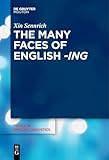The Many Faces of English -ing / Xin Sennrich.
Material type: TextSeries: Topics in English Linguistics [TiEL] ; 111Publisher: Berlin ; Boston : De Gruyter Mouton, [2022]Copyright date: ©2022Description: 1 online resource (IX, 203 p.)Content type:
TextSeries: Topics in English Linguistics [TiEL] ; 111Publisher: Berlin ; Boston : De Gruyter Mouton, [2022]Copyright date: ©2022Description: 1 online resource (IX, 203 p.)Content type: - 9783110764383
- 9783110764550
- 9783110764482
- 425.6 23
- PE1313 .S466 2022
- online - DeGruyter
- Issued also in print.
| Item type | Current library | Call number | URL | Status | Notes | Barcode | |
|---|---|---|---|---|---|---|---|
 eBook
eBook
|
Biblioteca "Angelicum" Pont. Univ. S.Tommaso d'Aquino Nuvola online | online - DeGruyter (Browse shelf(Opens below)) | Online access | Not for loan (Accesso limitato) | Accesso per gli utenti autorizzati / Access for authorized users | (dgr)9783110764482 |
Browsing Biblioteca "Angelicum" Pont. Univ. S.Tommaso d'Aquino shelves, Shelving location: Nuvola online Close shelf browser (Hides shelf browser)
Frontmatter -- Acknowledgements -- Contents -- 1 Introduction -- 2 Theoretical background -- 3 Adjectives -- 4 Participles -- 5 Consequences of analysing participles as adjectives -- 6 The categorial status of gerunds -- 7 Distinguishing gerunds from present participles -- 8 Drinking water and dancing girl: Verb-ing-Noun compounds and noun phrases -- 9 Conclusions -- Bibliography -- Data sources -- Author index -- Subject index
restricted access online access with authorization star
http://purl.org/coar/access_right/c_16ec
The book offers a new angle on long-standing questions about the categorial status of English participles and gerunds. The book makes a major point: participles are not verb forms which behave like adjectives, but actually are adjectives, linked with verbs via derivation. It argues that observed differences between participles and adjectives, which in the past have prompted linguists to draw a category distinction between them, are in reality due to the non-prototypical semantics of participles – a feature also found in other types of adjectives, with strikingly identical effects. This analysis then accounts for the word formation of adjectives such as boring, tired, drunk, which has always been mysterious. The book investigates the consequences of this analysis for our understanding of gerunds and V-ing-N compounds. With its comprehensive study of -ing forms, the book calls into question a number of widely-held assumptions – regarding the distinction between derivation and inflection, and the role of semantics in syntactic and morphological analysis. This book is of great interest to researchers and students in linguistics interested in morphology, syntax, semantics, lexical categorisation.
Issued also in print.
Mode of access: Internet via World Wide Web.
In English.
Description based on online resource; title from PDF title page (publisher's Web site, viewed 25. Jun 2024)









